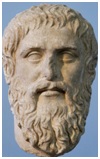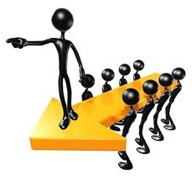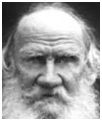|
 |
|
 |
|
|
||
War and Peace - Leadership and
Change
War and Peace (1865-9)
Written by the Russian author, Leo Tolstoy (1828-1910), pictured right. First published as a serial. Tolstoy probably modelled the character of Pierre (Bezukhov) on himself. His other famous book is Anna Karenina.
Set in... Russia in the early 1800’s
Fun facts
What about film and TV versions? The 1956 film starred:
The 1972 BBC TV series starred Anthony Hopkins as Pierre (pictured right below). Key characters Pierre (Bezukhov), illegitimate son of a rich count Natasha (Rostova), young lady Nikolai (Rostov), soldier and Natasha’s brother General Kutuzov, leader of the Russian army Platon Karataev, peasant Prince Andrei (Bolkonsky), soldier Napoleon, leader of the French army
The story The book begins in 1805 at a party in St Petersburg. The guests are wealthy aristocrats like:
At the Battle of Austerlitz Napoleon defeats the Russian army led by General Kutuzov which includes Nikolai and Andrei (who is wounded and and taken to a French hospital). Pierre:
Andrei's wife, Lise, dies giving birth to their son who is raised by Andrei's sister, Marya, in their father, Prince Bolkonsky's, house. Natasha falls in love with various men until she decides to marry Andrei. But, Prince
Bolkonsky, objects and asks them to wait a year. Andrei then returns from holiday but leaves Natasha after he discovers she had had a love affair with the roguish and extravagant Anatole Kuragin (Hélène's brother). Pierre is attracted to Natasha when he consoles her. Nikolai and Natasha’s youngest brother, Petya, joins the army when Napoleon (pictured right) invades Russia in 1812. Prince Bolkonsky also joins up just as the French take his estate. But Nikolai rescues Marya and they begin to fall in love. At the Battle of Borodino the smaller Russian army (including Andrei who is seriously wounded) is defeated by the French who are now occupying Moscow. Having failed to participate in the battle, Pierre wanders Moscow's streets, bewildered and shocked by the
widespread looting and murder. Having become miserable, confused and obsessed with the idea of killing Napoleon, he saves a girl from a
fire. Pierre's wife, Hélène, dies. Then Pierre is:
Natasha nurses Andrei, but he dies, forgiving Natasha and declaring his love for her. Petya (Natasha's younger brother) is killed in action, and Natasha and Marya become good friends. The French (short of food and supplies) leave Moscow, taking their prisoners of war including Pierre and Platon who is shot. Pierre is freed and now spiritually content. After a serious illness, he and Natasha realize they are in love. They marry in 1813 and have four children. Nikolai and Marya are also happily married.
Lessons for leadership and change
1. Be happy and wise Pierre finally finds happiness in :
The peasant, Platon (Russian for Plato, the Greek philosopher, pictured right above) shows him the
importance of:
Pierre (Henry Fonda) and Natasha (Audrey Hepburn) are pictured right in the 1956 film.
2. Humility helps Unlike Napoleon, the Russian military leader, General Kutuzov is a good man with:
These attributes make his speeches sincere and inspiring. 3. The importance of fate and predestination People (and their leaders) are unconsciously influenced by the predetermined course of history. This is what Tolstoy means when he wrote: “A king is history’s slave”. Tolstoy believed that leaders:
4. Sensitivity to people’s needs Kutuzov:
Andrei (Mel Ferrer) is pictured right above with Natasha (Audrey Hepburn) in the 1956 film.
5. Patiently persevere Kutuzov lost at Austerlitz and Borodino and was heavily criticized during 1812 and 1813 by many people including the Tsar (the Russian king). But his motto “Patience and time” gave him victory over Napoleon, when he patiently waited for the French to retreat through lack of food and supplies.
6. Power comes from the people A leader’s power, says Tolstoy, is: “the collective will of the people”, The strength of an army depends upon its:
“A battle is won by those who firmly resolve to win it!”, says Prince Andrei. Andrei is pictured right with Pierre (left) and Natasha in the film.
7. Plan ahead The French disastrously didn’t prepare themselves for the Arctic Russian winter.
8. Only do what’s possible Kutuzov didn’t defend Moscow, because it was impossible to do so successfully.
9. Don’t over-estimate change Tolstoy (pictured right) said that, despite the wars in the book, “turbulence” wasn’t its ”predominant characteristic” but the relative calm of people getting on with their lives.
Key quotes on happiness Seize the moments of happiness, love and be loved. That is the only reality in the world, all else is folly. Love is life. All, everything that I understand, I understand because I love, Prince Andrei
Key quote on strategy A battle is won by those who firmly resolve to win it!, Prince Andrei.
Key quotes on wisdom We can know only that we know nothing. And that is the highest degree of human wisdom. There is no greatness where simplicity, goodness and truth are absent.
Key quotes on leadership Everything comes in time to him who knows how to wait, General Kutuzov When in doubt, my dear fellow, do nothing, General Kutuzov Patience and time, General Kutozov's motto. It's too easy to criticize a man when he's out of favour, and to make him shoulder the blame for everybody else's mistakes.
Key quote on war War is not a polite recreation, but the vilest thing in life, Prince Andrei
Key quote on religion To love life is to love God, Pierre
Key quote on freedom A man having no freedom cannot be conceived of except as deprived of life
Key quotes on stress and pain Only the vicissitudes of life can show us its variety, and develop our innate love of death or of rebirth to a new life, Pierre Pure and complete sorrow is as impossible as pure and complete joy.
Two literature websites to recommend 1. sparknotes.com 2. litcharts.com |
|
|
||
|
|
||
| Copyright © wisdomtowin.com 2025 All Rights Reserved | ||
|



-56film.jpg)











